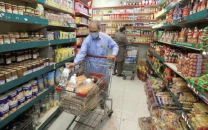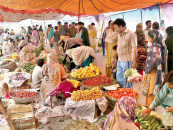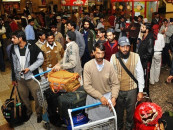Wheat exports: Food ministry requests additional subsidy
Wants ECC to add further support of $25 per ton

There is 9 million tons of wheat left over from the previous stock and an additional 26 million tons has already reached the market. PHOTO: FILE
A source in the ministry told The Express Tribune that steps have been taken to curtail the Pakistani wheat price in the international market to make the commodity price more competitive.
The price of Pakistani wheat is much higher than other countries due to high cost of agriculture inputs including pesticides, fertiliser and tariff charges on the agriculture tube wells. Additionally the huge quantity of surplus wheat lying in the country’s storages is also creating difficulties. The government has already sanctioned a subsidy of $45 and $55 on per ton on wheat export in Sindh and Punjab, respectively. However, this step also failed to bring any result as the price of the commodity in the international market is still high and cannot compete with other countries.
Due to this price difference, Pakistani wheat cannot be exported and the country is facing trouble due to surplus stock.
According to an official, there is 9 million tons of wheat leftover from the previous stock and an additional 26 million tons of new stock has already reached the market. “This is yet another step to attract international buyers so that the surplus wheat stock could be sold sooner rather than later,” said the official.
Despite the sanction of subsidy last year, the government failed to export the target of 1.2 million tons and has managed to dispose only 0.3 million during the whole year.
The ECC will take up the issue in its upcoming meetings next week.
The food ministry also suggested that the government should try other alternate and innovative approaches to dispose of the surplus wheat including its distributing to the beneficiaries of the Benazir Income Support Program (BISP), but it could not materialise due to lack of interest by other concerned departments.
The ministry had proposed to the foreign office that it must take the issue through diplomatic channels to barter wheat in exchange of oil with Gulf countries. However, this proposal failed to materialise as well.
Published in The Express Tribune, June 19th, 2016.
Like Business on Facebook, follow @TribuneBiz on Twitter to stay informed and join in the conversation.



















COMMENTS
Comments are moderated and generally will be posted if they are on-topic and not abusive.
For more information, please see our Comments FAQ